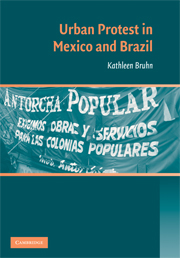Book contents
- Frontmatter
- Contents
- List of Tables
- List of Figures
- List of Abbreviations
- Acknowledgments
- 1 Riding the Tiger: Popular Organizations, Political Parties, and Urban Protest
- 2 Setting the Stage: Research Design, Case Selection, and Methods
- 3 The Limits of Loyalty
- 4 A Union Born Out of Struggles: The Union of Municipal Public Servants of São Paulo
- 5 Partisan Loyalty and Corporatist Control: The Unified Union of Workers of the Government of the Federal District
- 6 Clients or Citizens? Neighborhood Associations in Mexico City
- 7 Favelas and Cortiços: Neighborhood Organizing in São Paulo
- 8 The Dynamics of Protest
- Appendix
- Selected Sources
- Index
2 - Setting the Stage: Research Design, Case Selection, and Methods
Published online by Cambridge University Press: 26 July 2009
- Frontmatter
- Contents
- List of Tables
- List of Figures
- List of Abbreviations
- Acknowledgments
- 1 Riding the Tiger: Popular Organizations, Political Parties, and Urban Protest
- 2 Setting the Stage: Research Design, Case Selection, and Methods
- 3 The Limits of Loyalty
- 4 A Union Born Out of Struggles: The Union of Municipal Public Servants of São Paulo
- 5 Partisan Loyalty and Corporatist Control: The Unified Union of Workers of the Government of the Federal District
- 6 Clients or Citizens? Neighborhood Associations in Mexico City
- 7 Favelas and Cortiços: Neighborhood Organizing in São Paulo
- 8 The Dynamics of Protest
- Appendix
- Selected Sources
- Index
Summary
This chapter establishes the empirical and historical context in which protest data were collected and describes the methods used to collect it. It also provides a first-order analysis of aggregate patterns of protest. Preliminary findings suggest that organization type, party alliance, and electoral cycles all matter for protest strategies.
MUNICIPAL GOVERNMENTS AND PROTEST
In order to test the theoretical hypotheses proposed in Chapter 1, the data must meet several criteria: (1) cover an adequate number and variety of organizations (to measure the impact of organizational type); (2) include a variety of organizational alliances, as well as organizations not allied to political parties; (3) cover periods of at least one alternation in power (to measure the impact of party allies in and out of power); and (4) cover these organizations across a sufficient span of time to determine whether behavior changes according to cyclical patterns (to measure whether electoral, budgetary, or administrative cycles matter).
The choice to focus on municipal governments addresses these criteria admirably. The particular municipal governments I examine administered large urban areas. I do not mean to suggest that rural protest is unimportant; indeed, movements like the Landless Movement (MST) in Brazil and the zapatistas in Mexico have had a significant impact on their respective nations' politics. Nevertheless, large urban areas tend to produce a wider variety of organization types and party alliance choices, permitting maximum variation on two key independent variables. These areas also offer the pragmatic advantage of multiple local media covering protest.
- Type
- Chapter
- Information
- Urban Protest in Mexico and Brazil , pp. 20 - 39Publisher: Cambridge University PressPrint publication year: 2008



